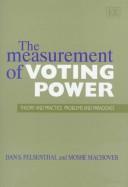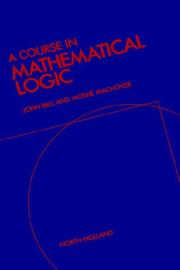| Listing 1 - 5 of 5 |
Sort by
|

ISBN: 1858988055 Year: 1998 Publisher: Cheltenham Elgar
Abstract | Keywords | Export | Availability | Bookmark
 Loading...
Loading...Choose an application
- Reference Manager
- EndNote
- RefWorks (Direct export to RefWorks)
Microeconomics --- Operational research. Game theory --- Political sociology --- Voting. --- Power (Social sciences) --- 324.6 --- Empowerment (Social sciences) --- Political power --- Exchange theory (Sociology) --- Political science --- Social sciences --- Sociology --- Consensus (Social sciences) --- Polls --- Elections --- Politics, Practical --- Social choice --- Suffrage --- Élections --- Comportement electoral
Book
ISBN: 3642204406 3642429556 9786613573315 3642204414 1280395397 Year: 2012 Publisher: New York : Springer,
Abstract | Keywords | Export | Availability | Bookmark
 Loading...
Loading...Choose an application
- Reference Manager
- EndNote
- RefWorks (Direct export to RefWorks)
Both theoretical and empirical aspects of single- and multi-winner voting procedures are presented in this collection of papers. Starting from a discussion of the underlying principles of democratic representation, the volume includes a description of a great variety of voting procedures. It lists and illustrates their susceptibility to the main voting paradoxes, assesses (under various models of voters' preferences) the probability of paradoxical outcomes, and discusses the relevance of the theoretical results to the choice of voting system. Studies in Choice and Welfare is a book series dedicated to the ethical and positive aspects of welfare economics and choice theory. Topics comprise individual choice and preference theory, social choice and voting theory (normative, positive and strategic sides) as well as all aspects of welfare theory (Pareto optimality; welfare criteria; fairness, justice and equity; externalities; public goods; optimal taxation; incentives in public decision making; cost-benefit analysis, etc.).
Constitutional law. --- Economics, Mathematical. --- Mathematics. --- Political science -- Philosophy. --- Politics, Practical. --- Government - General --- Business & Economics --- Law, Politics & Government --- Economic Theory --- Political Institutions & Public Administration - General --- Elections. --- Electoral politics --- Mass political behavior --- Political behavior --- Politics --- Practical politics --- Franchise --- Polls --- Political science. --- Political philosophy. --- Game theory. --- Welfare economics. --- Economics. --- Social Choice/Welfare Economics/Public Choice. --- Political Science. --- Game Theory, Economics, Social and Behav. Sciences. --- Political Philosophy. --- Constitutional Law. --- Economic policy --- Economics --- Social policy --- Constitutional law --- Constitutional limitations --- Constitutionalism --- Constitutions --- Limitations, Constitutional --- Public law --- Administrative law --- Games, Theory of --- Theory of games --- Mathematical models --- Mathematics --- Political philosophy --- Administration --- Civil government --- Commonwealth, The --- Government --- Political theory --- Political thought --- Science, Political --- Social sciences --- State, The --- Interpretation and construction --- Political science --- Political participation --- Politics, Practical --- Plebiscite --- Political campaigns --- Representative government and representation --- Social Choice/Welfare Economics/Public Choice/Political Economy. --- Philosophy. --- Math --- Science --- Social choice. --- Social Choice and Welfare. --- Game Theory. --- Choice, Social --- Collective choice --- Public choice --- Choice (Psychology) --- Social psychology --- Welfare economics

ISBN: 0720428440 9780720428445 Year: 1977 Publisher: Amsterdam : North-Holland,
Abstract | Keywords | Export | Availability | Bookmark
 Loading...
Loading...Choose an application
- Reference Manager
- EndNote
- RefWorks (Direct export to RefWorks)
Logic, Symbolic and mathematical --- Logique symbolique et mathématique --- 510.6 --- Algebra of logic --- Logic, Universal --- Mathematical logic --- Symbolic and mathematical logic --- Symbolic logic --- Mathematics --- Algebra, Abstract --- Metamathematics --- Set theory --- Syllogism --- 510.6 Mathematical logic --- Logic, symbolic and mathematical --- Logic, Symbolic and mathematical. --- Logique mathématique --- Informatique --- Langages de programmation --- Logique mathématique. --- Informatique. --- Langages de programmation.
Book
ISBN: 3030933202 3030933210 Year: 2022 Publisher: Cham, Switzerland : Springer Nature Switzerland AG,
Abstract | Keywords | Export | Availability | Bookmark
 Loading...
Loading...Choose an application
- Reference Manager
- EndNote
- RefWorks (Direct export to RefWorks)
Labor economics. --- Capitalism. --- Labor. --- Labor and laboring classes --- Manpower --- Work --- Working class --- Market economy --- Economics --- Profit --- Capital
Multi
ISBN: 9783030933210 9783030933203 9783030933227 9783030933234 Year: 2022 Publisher: Cham Springer International Publishing
Abstract | Keywords | Export | Availability | Bookmark
 Loading...
Loading...Choose an application
- Reference Manager
- EndNote
- RefWorks (Direct export to RefWorks)
This book presents a probabilistic approach to studying the fundamental role of labor in capitalist economies and develops a non-deterministic theoretical framework for the foundations of political economy. By applying the framework to real-world data, the authors offer new insights into the dynamics of growth, wages, and accumulation in capitalist development around the globe. The book demonstrates that a probabilistic political economy based on labor inputs enables us to describe central organizing principles in modern capitalism. Starting from a few basic assumptions, it shows that the working time of employees is the main regulating variable for determining strict numerical limits on the rate of economic growth, the range of wages, and the pace of accumulation under the present global economic system. This book will appeal to anyone interested in how the capitalist mode of production works and its inherent limitations; in particular, it will be useful to scholars and students of Marxian economics. "Emmanuel Farjoun and Moshé Machover, follow up their pathbreaking work on the application of statistical physics methods to political economy in this book with David Zachariah, in which they develop methods for making educated and structured estimates of stylized facts applicable to capitalist economies. There's a lot for economists and anyone interested in the political economy of capitalism to learn from their reasoning on these issues, including their novel and challenging suggestion of bounds on the rates of increase of use-value productivity of labor, and on the range of variation of the wage share." Duncan K. Foley Leo Model Professor of Economics New School for Social Research.
Politics --- Quantitative methods (economics) --- Methodology of economics --- Economic schools --- Labour economics --- Economics --- History --- economie --- geschiedenis --- politiek --- arbeid --- econometrie --- Travail --- Labor economics --- Travailleurs --- Working class --- Économie politique. --- Economics.
| Listing 1 - 5 of 5 |
Sort by
|

 Search
Search Feedback
Feedback About UniCat
About UniCat  Help
Help News
News